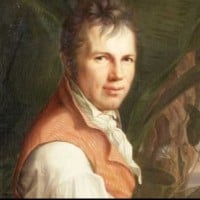Top Ten Most Famous People from Germany
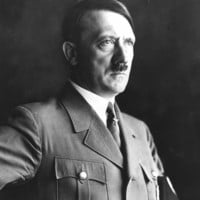 Adolf Hitler (April 20, 1889 - April 30, 1945) was a German politician of Austrian descent who served as the leader of the Nazi Party since 1921, Chancellor of Germany since 1933, and Führer of Nazi Germany since 1934. As dictator of Nazi Germany, he reversed the Treaty of Versailles, initiated World War II in Europe with the invasion of Poland in September 1939, and was a central figure of the Holocaust... read more
Adolf Hitler (April 20, 1889 - April 30, 1945) was a German politician of Austrian descent who served as the leader of the Nazi Party since 1921, Chancellor of Germany since 1933, and Führer of Nazi Germany since 1934. As dictator of Nazi Germany, he reversed the Treaty of Versailles, initiated World War II in Europe with the invasion of Poland in September 1939, and was a central figure of the Holocaust... read more Unfortunately he comes to mind for many when Germany is mentioned.
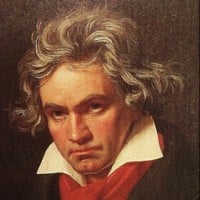 Ludwig van Beethoven was a German composer and pianist. A crucial figure in the transition between the Classical and Romantic eras in Western art music, he remains one of the most famous and influential of all composers. His best-known compositions include 9 symphonies, 5 piano concertos, 1 violin concerto, 32 piano sonatas, 16 string quartets, his great Mass the Missa solemnis, and one opera, Fidelio... read more
Ludwig van Beethoven was a German composer and pianist. A crucial figure in the transition between the Classical and Romantic eras in Western art music, he remains one of the most famous and influential of all composers. His best-known compositions include 9 symphonies, 5 piano concertos, 1 violin concerto, 32 piano sonatas, 16 string quartets, his great Mass the Missa solemnis, and one opera, Fidelio... read more Really great composer and pianist. Probably, the greatest musician ever.
The greatest musician of all time.
 Albert Einstein (14 March 1879 – 18 April 1955) was a German-born theoretical physicist, widely acknowledged to be one of the greatest and most influential physicists of all time. Einstein is best known for developing the theory of relativity, but he also made important contributions to the development of the theory of quantum mechanics. Relativity and quantum mechanics are together the two pillars... read more
Albert Einstein (14 March 1879 – 18 April 1955) was a German-born theoretical physicist, widely acknowledged to be one of the greatest and most influential physicists of all time. Einstein is best known for developing the theory of relativity, but he also made important contributions to the development of the theory of quantum mechanics. Relativity and quantum mechanics are together the two pillars... read more Einstein made great scientific advancements, that revolutionized science. His theory of relativity influenced the Atomic Bomb, but Albert Einstein was wary of the weapon.
"I know not what weapons World War 3 will be fought, but World War 4 will be fought with sticks and stones" -Albert Einstein
He was a very smart man, perhaps the smartest human, he created the atom bomb, with help of other scientists
I don't know why Hitler is on this list. Hitler was Austrian, not German. Least that's where he was born.
 Karl Heinrich Marx ( 5 May 1818 – 14 March 1883) was a German philosopher, critic of political economy, economist, historian, sociologist, political theorist, journalist and socialist revolutionary. His best-known titles are the 1848 pamphlet The Communist Manifesto and the four-volume Das Kapital (1867–1883). Marx's political and philosophical thought had enormous influence on subsequent intellectual,... read more
Karl Heinrich Marx ( 5 May 1818 – 14 March 1883) was a German philosopher, critic of political economy, economist, historian, sociologist, political theorist, journalist and socialist revolutionary. His best-known titles are the 1848 pamphlet The Communist Manifesto and the four-volume Das Kapital (1867–1883). Marx's political and philosophical thought had enormous influence on subsequent intellectual,... read more
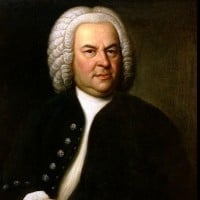 Johann Sebastian Bach was a German composer and musician of the Baroque period. He is known for instrumental compositions such as the Brandenburg Concertos and the Goldberg Variations as well as for vocal music such as the St Matthew Passion and the Mass in B minor.
Johann Sebastian Bach was a German composer and musician of the Baroque period. He is known for instrumental compositions such as the Brandenburg Concertos and the Goldberg Variations as well as for vocal music such as the St Matthew Passion and the Mass in B minor.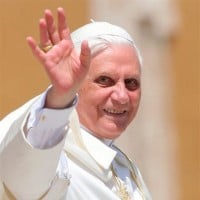 Pope Benedict XVI was born on April 16, 1927, in the town of Marktl, Germany. He served as the head of the Catholic Church in Vatican City from 2005 until his resignation in 2013... read more
Pope Benedict XVI was born on April 16, 1927, in the town of Marktl, Germany. He served as the head of the Catholic Church in Vatican City from 2005 until his resignation in 2013... read more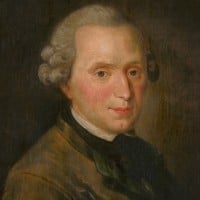
 Johannes Gensfleisch zur Laden zum Gutenberg (c. 1398 – February 3, 1468) was a German blacksmith, goldsmith, printer, and publisher who introduced printing to Europe.
Johannes Gensfleisch zur Laden zum Gutenberg (c. 1398 – February 3, 1468) was a German blacksmith, goldsmith, printer, and publisher who introduced printing to Europe.His introduction of mechanical movable type printing to Europe started the Printing Revolution and is widely regarded as the most important invention of the second millennium, the seminal event which ushered in the modern period... read more
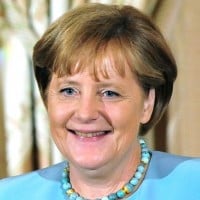 Angela Dorothea Merkel (born July 17, 1954) is a German former politician who served as the Chancellor of Germany (2005–2021). She was also the leader of the Christian Democratic Union (2000–2018). Growing up in East Germany, she was a cultural official for the Free German Youth, the youth organization of the ruling Socialist Unity Party of Germany. In 1986, she obtained a doctorate in quantum... read more
Angela Dorothea Merkel (born July 17, 1954) is a German former politician who served as the Chancellor of Germany (2005–2021). She was also the leader of the Christian Democratic Union (2000–2018). Growing up in East Germany, she was a cultural official for the Free German Youth, the youth organization of the ruling Socialist Unity Party of Germany. In 1986, she obtained a doctorate in quantum... read more She is the only woman president/chancellor in the world, right?
The strongest woman in the Earth.
 Friedrich Wilhelm Nietzsche was a German philosopher, cultural critic, poet, and Latin and Greek scholar whose work has exerted a profound influence on Western philosophy and modern intellectual history.
Friedrich Wilhelm Nietzsche was a German philosopher, cultural critic, poet, and Latin and Greek scholar whose work has exerted a profound influence on Western philosophy and modern intellectual history.The Newcomers
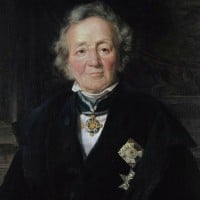

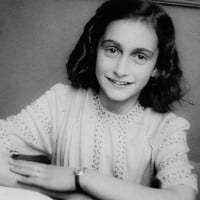 Annelies Marie Frank was a German-born diarist. Anne for short. One of the most discussed Jewish victims of the Holocaust, she gained fame posthumously with the publication of The Diary of a Young Girl in which she documents her life in hiding from 1942 to 1944, during the German occupation of the Netherlands in World War II. She was discovered with her group and arrested on August 4th, 1944. She... read more
Annelies Marie Frank was a German-born diarist. Anne for short. One of the most discussed Jewish victims of the Holocaust, she gained fame posthumously with the publication of The Diary of a Young Girl in which she documents her life in hiding from 1942 to 1944, during the German occupation of the Netherlands in World War II. She was discovered with her group and arrested on August 4th, 1944. She... read more She was jewish-German, she hid from the Nazis until like months or a year (I think) after hiding.
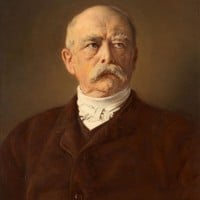 Otto Eduard Leopold, Prince of Bismarck, Duke of Lauenburg, known as Otto von Bismarck, was a conservative Prussian statesman who dominated German and European affairs from the 1860s until 1890. In the 1860s, he engineered a series of wars that unified the German states, deliberately excluding Austria, into a powerful German Empire under Prussian leadership.
Otto Eduard Leopold, Prince of Bismarck, Duke of Lauenburg, known as Otto von Bismarck, was a conservative Prussian statesman who dominated German and European affairs from the 1860s until 1890. In the 1860s, he engineered a series of wars that unified the German states, deliberately excluding Austria, into a powerful German Empire under Prussian leadership.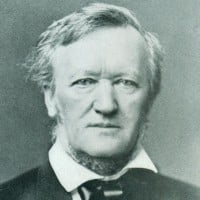 Wilhelm Richard Wagner was a German composer, theatre director, polemicist, and conductor who is primarily known for his operas.
Wilhelm Richard Wagner was a German composer, theatre director, polemicist, and conductor who is primarily known for his operas. Martin Luther was a German professor of theology, composer, priest, monk and a seminal figure in the Protestant Reformation.
Martin Luther was a German professor of theology, composer, priest, monk and a seminal figure in the Protestant Reformation.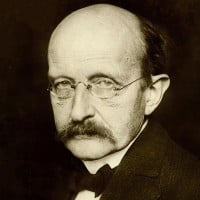 Max Karl Ernst Ludwig Planck was a German quantum physicist who was born on April 23, 1858 in Kiel, Germany. He is best known for winning a Nobel prize on the field of physics in 1918 and he published his own well known book called treatise on thermodynamics. His accomplishments was for being elected into the royal society by foreign membership in 1926 and was being the Copley medal in 1928 and was... read more
Max Karl Ernst Ludwig Planck was a German quantum physicist who was born on April 23, 1858 in Kiel, Germany. He is best known for winning a Nobel prize on the field of physics in 1918 and he published his own well known book called treatise on thermodynamics. His accomplishments was for being elected into the royal society by foreign membership in 1926 and was being the Copley medal in 1928 and was... read more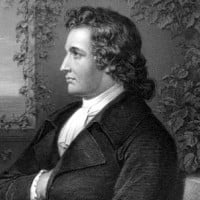 Johann Wolfgang Goethe (28 August 1749 – 22 March 1832) was a German writer and statesman. His body of work includes epic and lyric poetry written in a variety of metres and styles; prose and verse dramas; memoirs; an autobiography; literary and aesthetic criticism; treatises on botany, anatomy, and colour; and four novels. In addition, numerous literary and scientific fragments, more than 10,000... read more
Johann Wolfgang Goethe (28 August 1749 – 22 March 1832) was a German writer and statesman. His body of work includes epic and lyric poetry written in a variety of metres and styles; prose and verse dramas; memoirs; an autobiography; literary and aesthetic criticism; treatises on botany, anatomy, and colour; and four novels. In addition, numerous literary and scientific fragments, more than 10,000... read more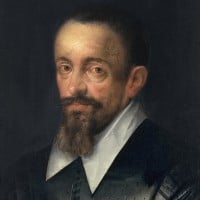
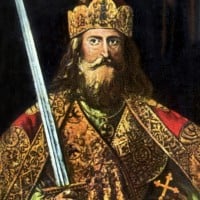
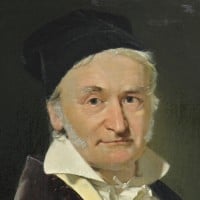 Johann Carl Friedrich Gauss was a German mathematician who contributed significantly to many fields, including number theory, algebra, statistics, analysis, differential geometry, geodesy, geophysics, mechanics, electrostatics, astronomy, matrix theory, and optics.
Johann Carl Friedrich Gauss was a German mathematician who contributed significantly to many fields, including number theory, algebra, statistics, analysis, differential geometry, geodesy, geophysics, mechanics, electrostatics, astronomy, matrix theory, and optics.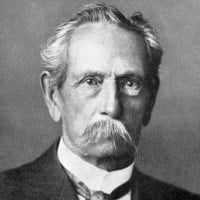
 Wernher Magnus Maximilian Freiherr von Braun was a German, later an American, aerospace engineer and space architect credited with inventing the V-2 rocket for Nazi Germany and the Saturn V for the United States.
Wernher Magnus Maximilian Freiherr von Braun was a German, later an American, aerospace engineer and space architect credited with inventing the V-2 rocket for Nazi Germany and the Saturn V for the United States. Oskar Schindler (28 April 1908 – 9 October 1974) was a German industrialist, spy, and member of the Nazi Party who is credited with saving the lives of 1,200 Jews during the Holocaust by employing them in his enamelware and ammunitions factories, which were located in occupied Poland and the Protectorate ...read more.
Oskar Schindler (28 April 1908 – 9 October 1974) was a German industrialist, spy, and member of the Nazi Party who is credited with saving the lives of 1,200 Jews during the Holocaust by employing them in his enamelware and ammunitions factories, which were located in occupied Poland and the Protectorate ...read more.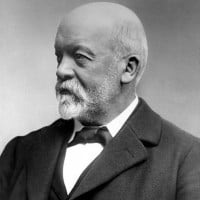
 Werner Karl Heisenberg was a German theoretical physicist and one of the key pioneers of quantum mechanics.
Werner Karl Heisenberg was a German theoretical physicist and one of the key pioneers of quantum mechanics.